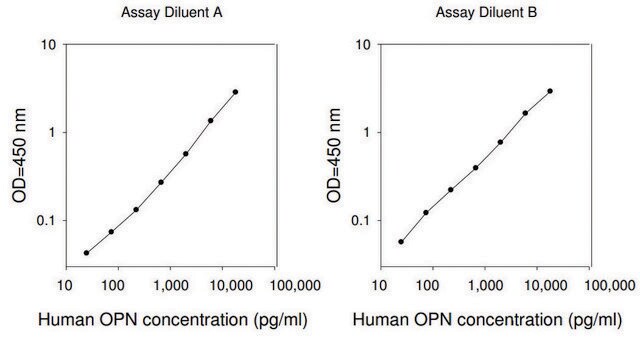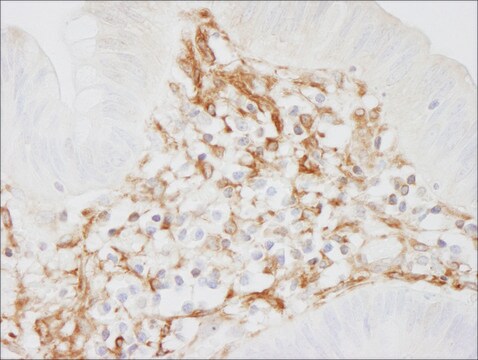O2260
Mouse Osteopontin
recombinant, expressed in NSO cells, powder, suitable for cell culture
Synonyme(s) :
Bone Sialoprotein-1, Early T Lymphocyte Activation Protein-1 (ETA-1), OPN, Secreted Phosphoprotein 1 (Spp1)
About This Item
Produits recommandés
product name
Osteopontin from mouse, >95% (SDS-PAGE), recombinant, expressed in NSO cells, lyophilized powder, suitable for cell culture
Source biologique
mouse
Niveau de qualité
Produit recombinant
expressed in NSO cells
Stérilité
sterile
Pureté
>95% (SDS-PAGE)
Forme
lyophilized powder
Poids mol.
30 kDa by SDS-PAGE (reducing)
65 kDa by SDS-PAGE (reducing) (doublet)
Conditionnement
pkg of 50 μg
Technique(s)
cell culture | mammalian: suitable
Impuretés
endotoxin, tested
Numéro d'accès UniProt
Conditions d'expédition
dry ice
Température de stockage
−20°C
Informations sur le gène
mouse ... Spp1(20750)
Application
- to study its role in a mouse model of preterm brain injury
- as a positive control to analyze the relationship between the vascular calcification process and osteopontin (OPN) overexpression in the neointima of atherosclerotic plaques
- to study its interaction on the crystal growth process of hydroxyapatite in agarose hydrogels
Actions biochimiques/physiologiques
Forme physique
Remarque sur l'analyse
Code de la classe de stockage
11 - Combustible Solids
Classe de danger pour l'eau (WGK)
WGK 3
Point d'éclair (°F)
Not applicable
Point d'éclair (°C)
Not applicable
Certificats d'analyse (COA)
Recherchez un Certificats d'analyse (COA) en saisissant le numéro de lot du produit. Les numéros de lot figurent sur l'étiquette du produit après les mots "Lot" ou "Batch".
Déjà en possession de ce produit ?
Retrouvez la documentation relative aux produits que vous avez récemment achetés dans la Bibliothèque de documents.
Notre équipe de scientifiques dispose d'une expérience dans tous les secteurs de la recherche, notamment en sciences de la vie, science des matériaux, synthèse chimique, chromatographie, analyse et dans de nombreux autres domaines..
Contacter notre Service technique







